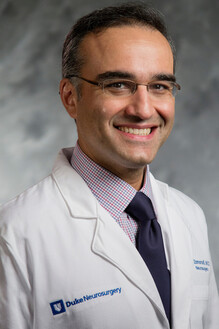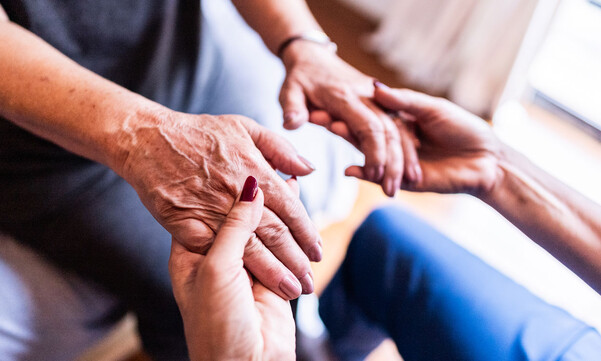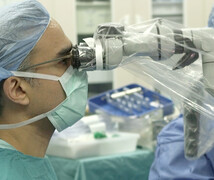As a college student in Greenville, SC, Marcie O’Neill began experiencing headaches, vision changes, numbness, and speech problems. After a trip to her local hospital, O’Neill learned that a narrowed artery in her brain had caused a stroke. A few months later, scans showed the narrowing in her artery had worsened, putting her at risk for another, potentially catastrophic stroke. That’s when she transferred to Duke, where a team of neurosurgeons performed a risky surgery to bypass her constricted blood vessels. Today, more than seven years later, O’Neill is married with a baby girl and is thriving.
Something Is Wrong
At first, Marcie O’Neill’s symptoms didn’t seem urgent. She was a young college student without any risk factors. She figured her headaches, dark spots in her vision, and hand numbness were probably just due to stress and lack of sleep. But her symptoms slowly got worse. One morning in January 2016, when a professor called on O’Neill to answer a question during class, she couldn’t get the words out. Afterward, a friend drove her to the local emergency room.
When a CT scan came back clear, doctors blamed O’Neill’s symptoms on a complex migraine and sent her home. But O’Neill felt like they were missing something, so she insisted on having an MRI. The scan showed that O’Neill had experienced a stroke. She was admitted to the hospital and underwent a battery of tests, but doctors couldn’t find the reason for her stroke.
O’Neill was released from the hospital without answers. During that time, O’Neill “felt like things were getting fuzzier.” She felt tired all the time, and it became harder to do routine tasks.
A Bad Feeling
In April 2016, O’Neill underwent a follow-up CT angiogram. This special kind of CT scan uses a contrast dye to highlight the body’s blood vessels. “I remember coming out of there crying because I just had a bad feeling about it,” O’Neill said. “I knew something was not right.”
Results showed a major blockage in one of her brain's arteries, which meant her brain was being starved of oxygen and she was at risk for another dangerous stroke. O’Neill quickly transferred to Duke where she met neurosurgeons Ali Zomorodi, MD, and Takanori Fukushima, MD.
“This blockage was in the dominant side of her brain,” Dr. Zomorodi said. “A stroke in that vessel would be devastating. It could affect her ability to understand or use language, use her dominant arm, and possibly her dominant leg.”
A Difficult Surgery for a Difficult Problem
Dr. Zomorodi and his colleagues suspected Moyamoya disease, a one-in-a-million disorder that causes arteries in the brain to thicken and block blood flow. Until then, none of O'Neill's doctors had mentioned anything about the possibility of this rare disease.
According to Dr. Zomorodi, “because Moyamoya affects young, seemingly healthy people, many providers don’t have a high level of suspicion,” he said. “For a young person having a stroke without all of the other risk factors, it is something that needs to be ruled out.”
Dr. Zomorodi recommended double-barrel bypass surgery -- a complex procedure that harvests blood vessels from the scalp and connects them to vessels in the brain to restore blood flow. The surgery requires a highly skilled neurosurgical team as well as an advanced neuroanesthesiology group to keep the brain safe while the patient is under general anesthesia.
“Although these surgeries are rare for most centers, we do a lot of them here at Duke,” Dr. Zomorodi said. “We’ve developed processes and have expertise in every area of care to make sure these patients have the best outcomes. That’s what really distinguishes us from many other centers in the country.”
Life After Brain Surgery
Since her operation, O’Neill, now 27, doesn’t take a single day for granted. She’s married, has a baby girl, and recently moved with her family to South Florida. She tries to take care of herself and follows up regularly with a neurologist to monitor for any new signs of trouble. Her advice for other people going through something similar is simple: “Trust your gut. Nobody knows the way you’re feeling in your own body better than you. If something is off, get a second opinion because things can just turn so quickly.”





